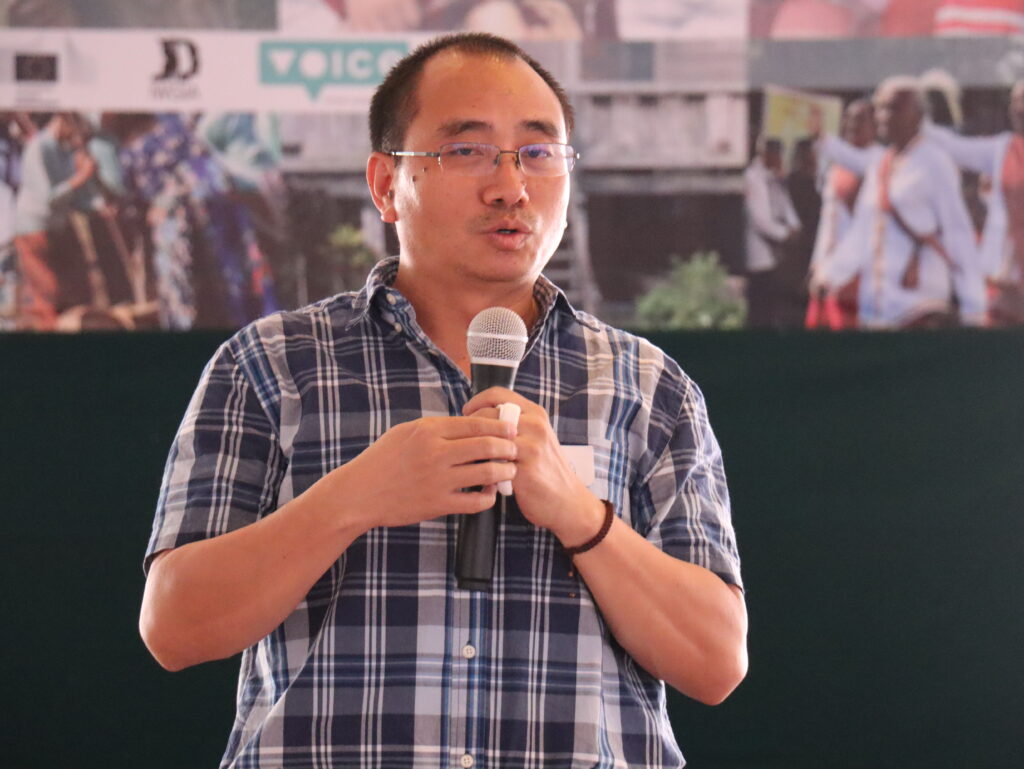
Binota Moy Dhamai is a Bangladeshi Indigenous rights activist. He is now serving as the Chair of the high-level UN Expert Mechanism on the Rights of Indigenous Peoples (EMRIP).
EMRIP advises the UN Human Rights Council on the rights of Indigenous Peoples. It assists UN Member States in achieving the United Nations Declaration on the Rights of Indigenous Peoples. It is among the most influential inter-governmental platforms addressing issues facing Indigenous peoples in the world.
Binota participated in DTP’s 2004 Indigenous Peoples, Human Rights, and Development Program and later returned to the program as a trainer. He is now a Ph.D. Candidate at the School of Regulation and Global Governance at the Australian National University.
Binota says his participation in the DTP program in Darwin, Australia helped him immensely. It was his first-ever international training. He remembers that he did not have adequate finance to travel to Australia from Bangladesh. However, realising Binota’s potential, DTP arranged a full scholarship for Binota.
Binota believes his election as Vice Chair of EMRIP is a manifestation of how DTP’s strategic investment in human rights advocates yields meaningful long-term impacts.
“I am very grateful to DTP for supporting me to participate in its Indigenous peoples’ training program in 2004. It was an incredible opportunity to understand international human rights mechanisms and Indigenous peoples’ issues,” Binota said. “It helped me to understand how to create monitoring bodies for rights violations and make a meaningful and strategic engagement with key stakeholders.”
Binota was born and grew up at the Chittagong Hill Tracts (CHT) in Bangladesh. CHT are a group of districts in Bangladesh, bordering Burma and Northeastern India. It was one of the most challenging places in the country to grow up as an Indigenous person. Despite their diverse identities, Indigenous peoples in the CHT identify collectively as Jumma people.
Binota’s motivation and passion for defending the rights of Indigenous people were entrenched in his daily lived experience in CHT.
In the childhood, on his way to school, he saw Jumma people were subjects of multiple military searches as if all of them were “suspects”. He saw how Bangladeshi security forces had forced Jumma people into free labour as if they were slaves. He particularly remembered the 1992 Logang massacre where Jumma people were targeted, murdered and their houses were burnt to ashes by the security forces, Bengali settlers in the Logang village in Khagrachari District. Binota was born in Khagrachari.
Binota says he became serious about activism when he was going to college. In 1996 Security officials’ forced “disappearance” of Indigenous rights activist Kalpana Chakma has left a long-lasting impact on him.
“Can you imagine a young woman like Kalpana Chakma, abducted in the middle of the night and nowhere to be found? There was nowhere to go for justice.”
That “disappearance” horrified the Indigenous community. Binota remembers his passionate participation in the rallies and seminars demanding Kalpana’s return. Kalpana is still missing.
Amnesty International notes that in the “1960s and 1970s, thousands were forced off their lands in CHT to make way for reservoirs and hydroelectric schemes, a displacement made worse by massacres against the Jumma people and nearly twenty years of conflict against a military dictatorship and also with the democratic government of Bangladesh.”
Though a peace accord recognising the rights of the Jumma people over their lands was signed in 1997, it remains largely unimplemented. Decades of state-sponsored Bengali settlement in the CHT have furthered displaced hundreds and thousands of Jumma people. The full and meaningful implementation of the CHT Accord 1997 may only be able to restore human rights of Jumma people and peace in the CHT region.
In the future, Binota will continue working to empower Indigenous peoples in Asia and he sees continuing collaboration with DTP in advancing Indigenous peoples’ rights in Asia-Pacific.
“There are many positive synergies between DTP and my work, surely we will work together in future to empower Indigenous peoples in the Asia-Pacific.”
DTP acknowledges the traditional custodians of the land on which we work, the Bedegal people of the Eora Nation. We recognise their lands were never ceded, and we acknowledge their struggles for recognition and rights and pay our respects to the Elders – past, present – and the youth who are working towards a brighter tomorrow. This continent always was and always will be Aboriginal land.
Aboriginal and Torres Strait Islander peoples should be aware that this website contains images or names of people who have passed away.
DTP acknowledges the traditional custodians of the land on which we work, the Bedegal people of the Eora Nation. We recognise their lands were never ceded, and we acknowledge their struggles for recognition and rights and pay our respects to the Elders – past, present – and the youth who are working towards a brighter tomorrow. This continent always was and always will be Aboriginal land.
Aboriginal and Torres Strait Islander peoples should be aware that this website contains images or names of people who have passed away.
Privacy Policy | Terms of Use | Disclaimer | Policies
© 2022 Diplomacy Training Program | ABN 31 003 925 148 | Web Design by Studio Clvr